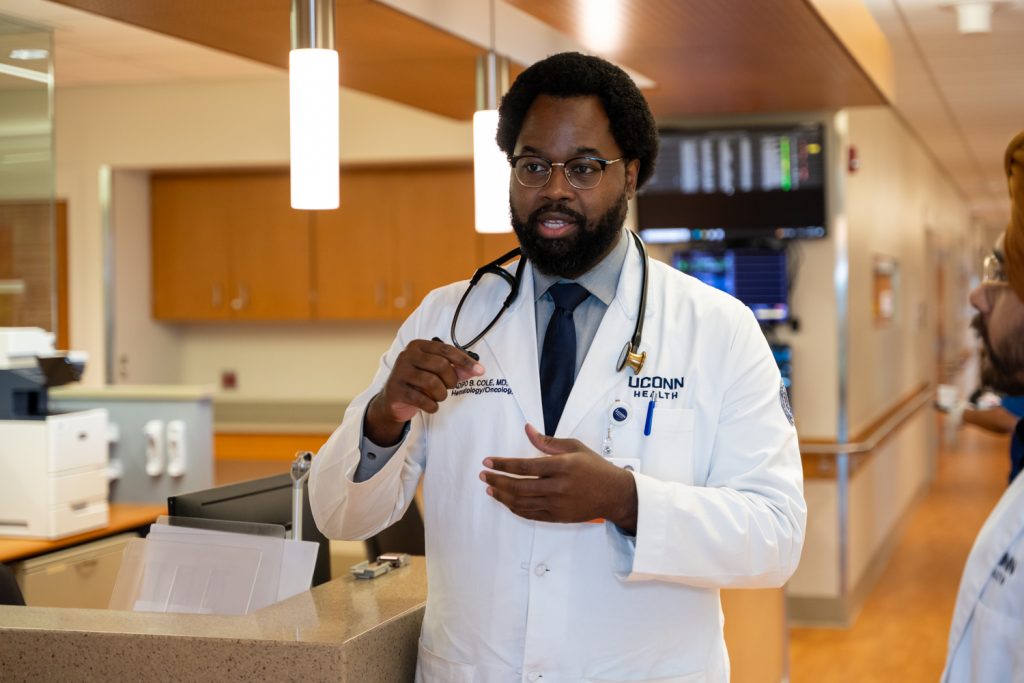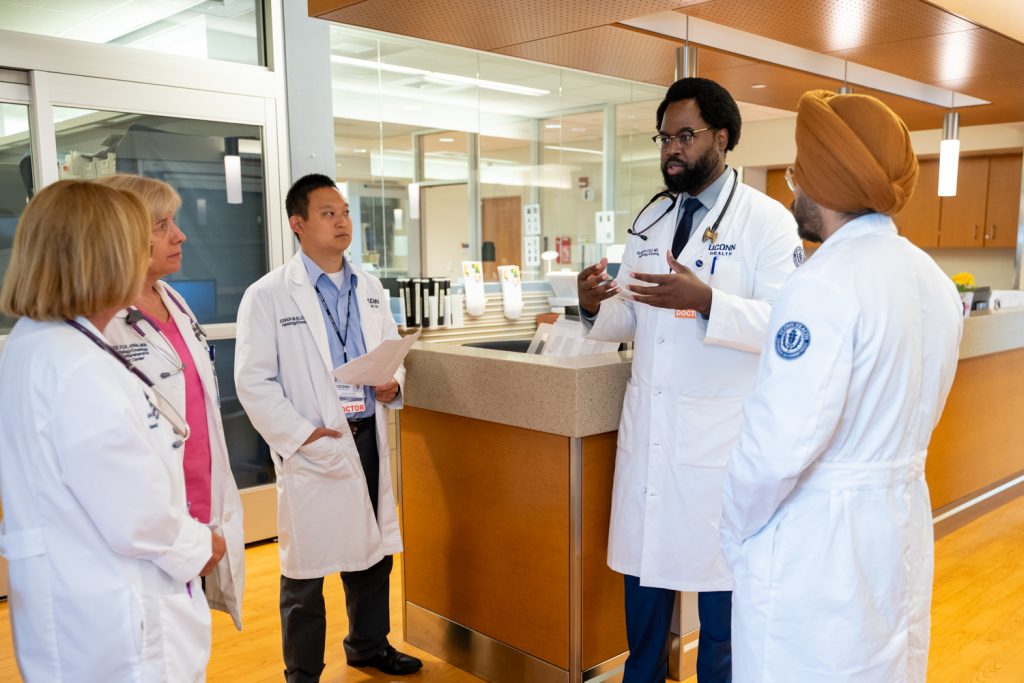Meet hematologist/oncologist Dr. Oladipo Cole, who just joined UConn Health as the new co-director of the expanding New England Sickle Cell Institute (NESCI).
“UConn Health is great. I love it here,” says Cole, who joined UConn Health in July and is an assistant professor of medicine at the UConn School of Medicine and co-director of the Connecticut Bleeding Disorders Center at UConn Health. “Wow, this is a really special place. This is where our sickle cell patients have a place to call home for all their inpatient and outpatient care needs.”
Cole says that when it comes to treating sickle cell disease, connection is key.


“I connect with people and find ways to connect with my sickle cell patients. As providers, we have to be able to build trust first. Then, patients can be willing to try the newest treatments,” says Cole, who wants to bring curative and transformative sickle cell treatments to UConn Health.
Every sickle cell patient she meets describes sickle cell pain differently—for example, as sharp, stabbing, or dull—but they all say no pain compares to the pain of sickle cell disease, not even the pain of childbirth.
“Sickle cell disease wreaks havoc on your body from head to toe,” says Cole, who has a strong personal connection to the disease that inspired him to become a doctor and an expert in sickle cell disease.
“My brother had sickle cell disease,” said Cole, who says patients to this day often face discriminatory practices and are not believed when they seek care for the painful, inherited red blood cell disease.
He also emphasizes that research into this disease and new therapies has lagged behind for a very long time until recently.
“I told my brother I would find a cure for you,” Cole emphasized, and he kept his promise. “My brother was able to get a bone marrow transplant. I was part of the medical team that examined him. It’s been over a year now and he’s doing phenomenally. He’s pain-free and his life has changed,” Cole happily recounts.
“I don’t want my brother’s success story to be unique. I want it to be unique to anyone with sickle cell disease,” Cole says.
Cole completed a hematology/oncology fellowship at Washington University School of Medicine, one of the nation’s top schools. He was also heavily involved in sickle cell disease research and completed an NIH special fellowship while attending the University of Illinois-Chicago.
“It was a great experience. I fell in love with the study of therapeutic treatments for sickle cell disease,” Cole says. “I now hope to advance the work to bring it to UConn Health.”


“UConn has the best sickle cell program in the country. I am here at UConn Health because nothing compares to the New England Sickle Cell Institute and its comprehensive sickle cell care, which was established by its director, Dr. Biree Andemariam, and her team,” says Cole. “The institute provides our sickle cell patients with cutting-edge, innovative care, supportive services and clinical research in one place that patients can call home. The holistic care and patient resources at UConn Health are unmatched. The UConn Health staff brings their skills, talents and compassion to the care of their patients.”
Cole adds, “Here at UConn, there is minimal stigma associated with sickle cell disease. We are also training and educating the next generation of healthcare workers.”
The New England Sickle Cell Institute is the first and only regional outpatient center of its kind dedicated to providing comprehensive treatment for the painful inherited red blood cell disease to help adults combat the daily suffering of sickle cell disease and improve their overall length and quality of life. The Institute is also working to identify more sickle cell disease patients in the surrounding communities to help them better manage their health, reduce pain symptoms and risk of disease complications, and keep them healthy so they can enjoy life more.
The Future of Sickle Cell Anemia Treatment
Cole emphasizes that this is a very exciting and hopeful time for sickle cell disease patients and research.
Now, the UConn Health Institute is looking to the future of sickle cell care. Cole and Andemariam, in collaboration with the newly hired director of the Blood and Marrow Transplant Program, Dr. Kapil S. Meleveedu, are working hard to provide sickle cell patients with bone marrow transplants like the one Cole’s brother received. In addition, they are working hard to soon provide access to a recently FDA-approved gene therapy for sickle cell disease, which is currently available at only a few centers nationwide. They also have several clinical trials open at UConn Health.
Cole also says that quite a few new drugs have been approved for sickle cell disease in recent years, with several more in the pipeline, and he promises to finally put a stop to this devastating disease.
“But we can’t stop sickle cell disease on our own,” Cole says. “Fortunately, we have a lot of support from our patients, advocacy groups and others, but we need more awareness and funding for research.”


Hope for healing and a hug without pain
“I think Dr. Cole is amazing,” said one new patient, Joudel Salmon, 37, of Manchester, a longtime sickle cell patient at UConn Health who has been treated since Dr. Biree Andemariam founded the adult sickle cell disease program.
“I transferred from Connecticut Children’s. I’ve been with UConn Health for 16 years,” she says, and she’s been cared for by the Andemariam Institute’s leader and a team of nurses, nurse practitioners and social workers who help her manage all of her health needs.
Expresses appreciation for the Institute and its care.
“It’s great, as are the forms of communication,” Salmon says. “They remind us about appointments and even send text messages a few weeks before appointments.”
This Sickle Cell Awareness Month, Salmon wants to make one thing clear to the world: “The word sickle cell is not widely known!” she says. “I’ve met a lot of people who don’t know what sickle cell is. We need to raise awareness.”
When it comes to sickle cell pain and care, Salmon says, “Don’t minimize my pain. It’s about being heard.”
He adds, “Dr. Cole can hear us!”
“It was hard living with sickle cell, and also not having people understand that I was in constant pain,” says Salmon, who can now only give her children air hugs because of her painful, daily sickle cell disease. She also needs chronic transfusions once a month at the Institute to reduce her experiences of pain crises.
Salmon is looking forward to the future therapeutic treatments that Cole and the Institute are working to make available at UConn Health for sickle cell patients like herself, and one thing, most important.
“A hug from my kids,” Salmon shares.
#Connecting #Sickle #Cell #Anemia #UConn #Today